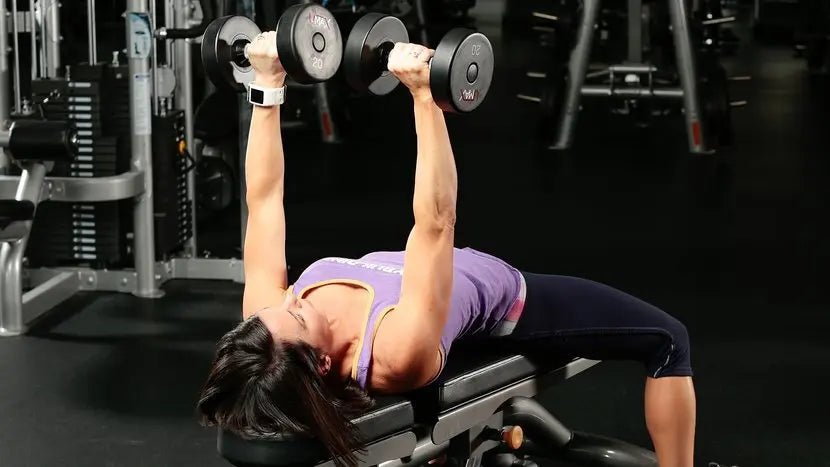
Can Dumbbell Press Replace Bench Press?
The world of fitness is filled with an array of exercises designed to target specific muscle groups and achieve various fitness goals. Two popular upper body exercises are the dumbbell press and the bench press. Both exercises are known for their effectiveness in building chest and arm strength. But can the dumbbell press replace the bench press? Let's delve into the details and find out.
Understanding the Dumbbell Press
The dumbbell press is a weight training exercise that targets the chest, shoulders, and triceps. It is performed using a pair of dumbbells and can be done either seated or standing. The main advantage of the dumbbell press is its ability to engage stabilizing muscles, which are often neglected in machine-based exercises.
Performing the dumbbell press correctly involves holding a dumbbell in each hand, positioning them at shoulder level with palms facing forward. The next step is to press the dumbbells upwards until the arms are fully extended, then slowly lowering them back to the starting position. This constitutes one repetition.
Benefits of the Dumbbell Press
The dumbbell press offers several benefits. Firstly, it allows for a greater range of motion compared to the bench press. This means that it can engage the muscles more effectively and lead to greater muscle growth. Secondly, the dumbbell press requires more balance and coordination, which can help improve overall body stability and muscle symmetry.
Another benefit of the dumbbell press is its versatility. It can be performed in various ways, such as incline, decline, or flat, to target different parts of the chest. Furthermore, it can be easily incorporated into home workouts as it requires less space and equipment compared to the bench press.
Understanding the Bench Press
The bench press is a classic weight training exercise that primarily targets the chest, shoulders, and triceps. It is performed using a barbell and a bench, hence the name. The bench press is known for its ability to build upper body strength and muscle mass effectively.
To perform the bench press, one must lie on a bench with feet flat on the ground. The barbell is then grasped with hands slightly wider than shoulder-width apart. The exercise involves lowering the barbell to the chest level and then pressing it upwards until the arms are fully extended. This constitutes one repetition.
Benefits of the Bench Press
The bench press is renowned for its effectiveness in building upper body strength. It allows for the lifting of heavier weights compared to the dumbbell press, which can lead to greater muscle growth. Additionally, the bench press is a compound exercise, meaning it engages multiple muscle groups at once, leading to a more efficient workout.
Another advantage of the bench press is its contribution to improving bone health. Weight-bearing exercises like the bench press have been shown to increase bone density, thereby reducing the risk of osteoporosis. Furthermore, the bench press is a staple in most strength and conditioning programs, making it a valuable exercise for athletes.
Can Dumbbell Press Replace Bench Press?
Whether the dumbbell press can replace the bench press depends on one's fitness goals and circumstances. If the goal is to build maximum strength and muscle mass, the bench press may be more suitable due to its ability to accommodate heavier weights. However, if the goal is to improve muscle balance, stability, and engage a wider range of motion, the dumbbell press may be a better choice.
It's also worth noting that the dumbbell press can be a good alternative for those who have shoulder issues or find the bench press uncomfortable. The dumbbell press allows for a more natural movement and can be adjusted to suit individual comfort levels.
Combining Dumbbell Press and Bench Press
Instead of choosing one over the other, combining the dumbbell press and bench press in a workout routine can provide the benefits of both exercises. This approach can lead to improved muscle growth, strength, stability, and symmetry. It also adds variety to the workout, which can help maintain motivation and prevent workout plateau.
For instance, one could start with the bench press to lift heavier weights and build strength, then move on to the dumbbell press to engage stabilizing muscles and achieve a full range of motion. This way, one can enjoy the best of both worlds.
Conclusion
In conclusion, both the dumbbell press and bench press are effective exercises for building upper body strength and muscle mass. Whether the dumbbell press can replace the bench press depends on individual fitness goals and circumstances. However, combining both exercises in a workout routine can provide a comprehensive upper body workout.
As always, it's important to perform these exercises with proper form to avoid injury and maximize effectiveness. If unsure, it's advisable to seek guidance from a fitness professional. Remember, consistency is key in any fitness journey. Happy lifting!






